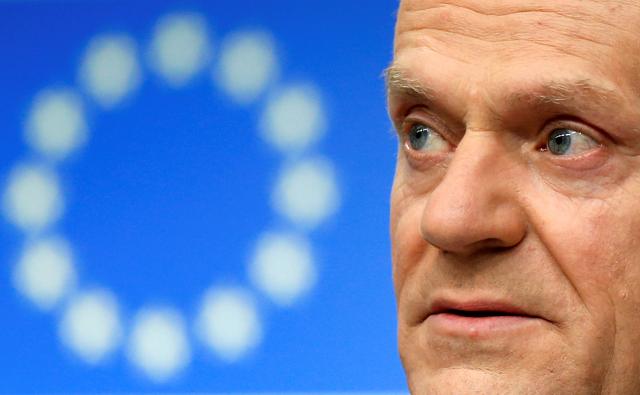Before lunching with May in London on the eve of her setting out her vision of an EU-UK trade deal, EU summit chair Tusk said Wednesday’s proposal to keep Northern Ireland in an EU customs union, creating possible barriers with the British mainland, was the best option to avoid a “hard border” with EU member Ireland.
“Until now, no-one has come up with anything wiser than that,” the European Council president told a conference in Brussels. “In a few hours I will be asking in London whether the UK government has a better idea, that would be as effective in preventing a hard border between Ireland and Northern Ireland.”
May will lay out her views on how to keep trade open between all of the United Kingdom and the European Union on Friday; Tusk will set out the EU negotiating proposals early next week, preparing for trade talks to begin after May has met the other 27 EU leaders at a summit in Brussels in three weeks time.
Britain argues that it can avoid creating frontier checks in Ireland that could reignite sectarian conflict in the north by technological and administrative innovations for a “smart border” that would maintain “frictionless trade”.
In publishing on Wednesday its first draft of a withdrawal treaty which both sides hope to agree by October, the EU said it would be happy to consider that. But in the meantime it was writing into clear legal language the “backstop” position it insists May agreed to in December. That position, however, left May’s key Unionist allies in Belfast furious that the EU plan would threaten their constitutional link to the British mainland.
“PURE ILLUSION”
Rhetoric on both sides has toughened in recent weeks as the difficulties of reaching a deal to avoid economic chaos when Britain leaves in 13 months have come into sharper focus. The pound softened on Thursday as investors focused on warnings from Brussels that a deal, which would also give business an extra couple of years to adjust to Brexit, was not yet guaranteed.
While it is not clear what trade solutions May will present on Friday, suggestions that it will involve different “baskets” of economic sectors differentiated by their degree of regulatory alignment with the EU prompted Tusk last week to describe such ideas as “pure illusion”. Others call it “cherry-picking”.
On Thursday, at a forum run by the EU employers federation Business Europe, the conservative former Polish premier renewed his sceptical appraisal of talk of “frictionless trade” once May carries out a plan to leave the single market and customs union.
“There can be no frictionless trade outside of the customs union and the Single Market,” Tusk said. “Friction is an inevitable side effect of Brexit. By nature.”
Britons opposed to leaving the EU are fighting a rearguard action that seeks to use May’s weakness in her own Conservative party and in parliament to disrupt it -- though there is little sign public opinion has shifted far from the roughly 50-50 split which delivered a narrow vote for Brexit in a 2016 referendum.
Tony Blair, the former Labour prime minister who is among the more prominent campaigners trying to halt Brexit, was in Brussels on Thursday, aiming to persuade EU policymakers to be ready to welcome Britain to remain if it changes its mind -- and be ready to show a will to reform, especially to moderate the very easy migration across the EU that worried many Britons.
Blair told the BBC that he was hearing positive reactions on the continent: “Brexit may be bad for Britain; it’s bad for Europe,” he said.
“So ... if it looks like Britain is prepared to change its mind, then if the price of that is Europe also putting forward changes and reforms ... then that is something that Europe should do.”
Tusk and other EU leaders have repeatedly said that Britain would be welcome to stay, although some also make clear they are not willing to undertake major reforms in order to do that.
Frans Timmermans, deputy head of the EU executive, told the European Parliament on Wednesday: “If they change their minds and want to come back to the European Union, I think we would all welcome them warmly back into the European Union family.”
More about: #Brexit
















































